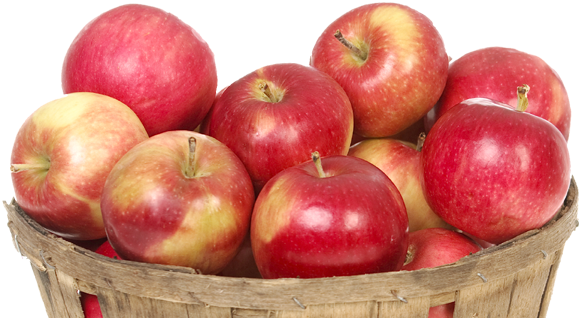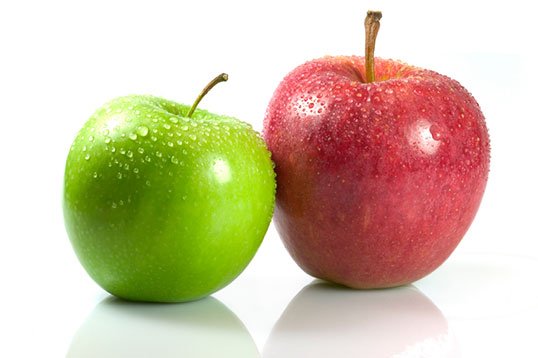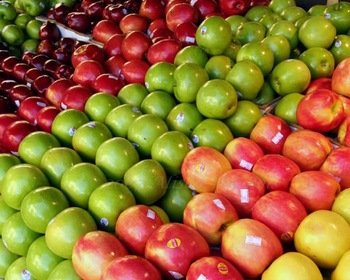
image source
Apple generation:
Apples come in all shades of red, green and yellow.
There are 7,500 assortments, or cultivars, of apples developed all through the world.
There are 2,500 assortments of apples developed in the United States.
Apples are developed in every one of the 50 states.
China, the United States, Turkey, Poland and Italy are the world best apple producers.
In 2006-2007, business world generation of apples was at 44,119,244 metric tons.
In 2006-2007, China drove the world in business apple generation with 24,480,000 metric tons, trailed by the United States with 4,460,544 metric tons.
Add up to apple generation in the United States in 2005 was 234.9 million containers, esteemed at $1.9 billion.
In 2006, 58 percent of the apples created in the United States were developed in Washington state, 11 percent in New York, 8 percent in Michigan, 5 percent in Pennsylvania, 4 percent in California and 2 percent in Virginia.
In 2005, 35.7 million bushels of new market apples were traded from the United States. That was 24 percent of the aggregate U.S. new market trim that year.
The Red Delicious assortment is the most broadly developed apple in the United States, with 62 million bushels reaped in 2005.
Business review wax is connected to numerous apples after they are reaped and cleaned. These waxes are produced using regular fixings.

source
Apple utilization
In 2005, the normal U.S. customer ate an expected 16.9 pounds of new market apples.
Sixty-three percent of the 2005 U.S. apple edit was eaten as new organic product.
Likewise in 2005, 36 percent of apples were handled into apple items, 18.6 percent was utilized as a part of juice and juice, 2 percent was dried, 2.5 percent was solidified, 12.2 percent was canned, and 0.7 percent was sold as new cuts. Apples were likewise utilized as a part of the making of child sustenance, creamy fruit spread or jam, and vinegar.
A "peck" of apples weighs 10.5 lbs. (4.8 kilograms).
A bushel of apples weighs around 42 lbs. (19 kg) and will yield 20-24 quarts of fruit purée.
It takes around 36 apples to make one gallon of apple juice.
.jpg)
image source
Apple history
The apple tree began in a territory between the Caspian Sea and the Black Sea.
The Lady or Api apple is one of the most seasoned assortments in presence.
Archeologists have discovered confirmation that people have appreciated apples since no less than 6500 B.C.
Burned apples have been found in ancient residences in Switzerland.
Apples were the most loved product of antiquated Greeks and Romans.
The Pilgrims planted the primary U.S. apple trees, in the Massachusetts Bay Colony.
Newton Pippin apples were the principal apples traded from America, in 1768; some were sent to Benjamin Franklin in London.
In 1730, the principal apple nursery was opened in Flushing, New York.
The world's biggest apple peel was made by Kathy Wafler Madison on Oct. 16, 1976, in Rochester, New York. It was 172 feet, 4 inches in length (52 meters). She was 16 years of age at the time and grew up to be a business chief for an apple tree nursery.
National Apple Month is the main national, nonexclusive apple advancement directed in the United States. At first settled in 1904 as National Apple Week, it was stretched out in 1996 to a three-month unique window from September through November.
The apple is the state product of Illinois, Minnesota, New York, Vermont, Washington and West Virginia.

image source
Apple science
The art of apple developing is called pomology.
Apples are individuals from the rose family.
The biggest apple at any point picked measured 3 lbs. (1.4 kg).
Apples have five seed pockets or carpels. Each pocket contains seeds. The life and soundness of the plant decides the quantity of seeds per carpel. Diverse assortments of apples have an alternate number of seeds.
Apples mature six to 10 times speedier at room temperature than when refrigerated.
We @farms find this post educative and insightful.
Resteem
(to be a part of this community; ensure to always use #farms and #steemchurch for agricultural related post)
SteemChurch Farm ( @FARMS)
Downvoting a post can decrease pending rewards and make it less visible. Common reasons:
Submit
Hello! I find your post valuable for the wafrica community! Thanks for the great post! @wafrica is now following you! ALWAYs follow @wafrica and use the wafrica tag!
Downvoting a post can decrease pending rewards and make it less visible. Common reasons:
Submit